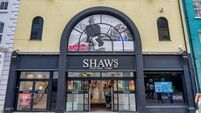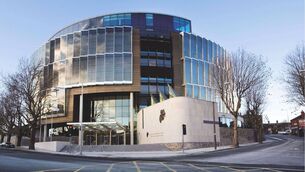Waterford Business owners brand council 'so far out of touch' as budget raises commercial rates again

Fianna Fáil councillor John O'Leary said Winterval acts as an indirect means of supporting local retail, as business owners continue to criticise the council over a perceived lack in support. Photo: Patrick Browne
Waterford City and County councillors voted 30-2 in favour of passing a €207 million budget that will see commercial rates rise by 3.5%. City centre businesses have lashed out against the council as they continue to protest rising costs.
Social Democrat Mary Roche and Independent David Daniels were the sole objectors to the proposed budget.
The council’s commercial rates, which are currently some of the highest in the country, will now rise to an Annual Rate Valuation (ARV) of .3082. The ARV functions as a multiplier on a business’s property value.
If a business’s property is valued at €10,000, the business will pay commercial rates of €3,082 to the council for the year. ARV has risen by 12.46% since 2020.
Chief Executive of Waterford City and County Council Sean McKeown framed the rise as a necessary measure, which will raise an additional €1.26 million for essential services. He said the rise was in line with the Consumer Price Index.
“This is a cost stability measure, ensuring we can continue delivering the services that businesses rely on every day,” Mr McKeown said.
“These include street cleaning and public rail maintenance, road and footpath upkeep.”
‘The Waterford Business Group’, a collection of almost 90 retailers based in the city centre, claimed Mr McKeown and the council were “so far out of touch” with the business costs facing SMEs.
Maeve Ryan and Dean Lavin, Managing Directors of The Book Centre and Gadget Man respectively, are two members of the business group.
They told the Waterford News & Star that operating a city centre SME has become almost untenable amid rising minimum wages, energy prices and the incoming auto-enrolment pension scheme.
Both said that if commercial rates were to continually rise without a perceived increase in support from the council, SMEs could take collective action and refuse to pay rates.
Members across party lines championed the budget as progressive and hailed the increase of €2.4 million earmarked for housing, while simultaneously striking issue with the increase in commercial rates.
Social Democrat Mary Roche said that while she believed “retailers need to be doing more themselves”, “when they tell us that they're feeling an awful lot of pain, I think we have to listen to them.”
Cllr. Roche proposed an amendment to the budget that would divert €1.26 million worth of spending from the general municipal allowance, economic development, local roads and housing, in order to stabilise commercial rates.
The proposal to decrease spending on roads (which is due to increase in the budget) was met with groans across the chamber. Cllr. Roche’s proposed amendment was not seconded.
Independent Councillor Joe O’Riordan said that a county-wide effort is “badly needed”.
“We can write off millions for the airport, put hundreds of thousands into Mount Congreve, but then we’re putting another punitive increase to the retail sector… Retail businesses feel they’re isolated and alone.”
Waterford Business Group sent a batch email to all 32 councillors on Sunday, November 23, and Monday, November 24.
The Book Centre’s Maeve Ryan said as of Tuesday afternoon, the group had received just three replies from councillors, with one being an automated response.
The group received correspondence from Fianna Fáil Councillor John O’Leary, bemoaning the group for emailing on a Sunday evening. Cllr. O’Leary insisted that it was a reply made in jest, intended towards an individual member of the business group.
Cllr. O’Leary said to the Waterford News & Star: “We know business is tough and it's difficult…the council in general puts an awful lot of money towards their way.”
He cited Winterval as a way in which council spending indirectly uplifts business in the city centre.
“I want to see the best shops in Waterford. We want to see the best facilities, the best retail and the best value for the people of Waterford.”
He said he could not support Cllr. Roche in stabilising commercial rates, as it would mean divesting from rural roads.
Ms Ryan and Mr Lavin cited the fate of The Vintage Factory and Slice Wood Fire Pizza, two local businesses that will close in December.
“It's make or break for a lot of businesses at this time of the year. [Commercial rates] are just adding an extra pressure and stress to go out of our way and combat this,” Mr Lavin said to the News & Star.
Ms Ryan said parking rates in the city are also having a detrimental effect on footfall, but the council’s correspondence with businesses is lack-lustre.
“Other towns have things like ‘pay for the first hour, get the second hour free’ or free parking between certain days, or the quiet days. We don't do any of that sort of stuff,” Ms Ryan said.
“The council here is so greedy they don't see the bigger picture.”
Mr Lavin currently represents the Waterford retailers on the City Centre Management Group - a coalition of local stakeholders and council members designed to coordinate on matters of economic interest.
He said “not one thing” about a commercial rates increase had been communicated during the management group’s last meeting on November 4.
Owner of Luca Records and Momo Restaurant Harry O’Neill described the city centre as “dead on its feet” with a crippling lack of footfall.
“It’s like a perfect storm,” Mr O’Neill said.
“A lot of businesses will go: ‘You know what? I actually can't do this anymore. I was already hanging on.’ So that'll tip those businesses over the edge, you'll see more businesses close, then the take from the rates for the council is going to drop again, and then you're going to have the council putting up the rates again.
“It's actually counterproductive.”
Mr McKeown said that Waterford’s relatively high ARV was a misleading figure, due to the fact that it is multiplied against Waterford’s property valuations, which may be cheaper than neighbouring counties.
He said that government funding now makes up 44% of the council’s budget, while income from local property tax and commercial rates has decreased to 31%.
He also pointed to the Prompt Payments Initiative, where any business that has registered with the initiative will not face an increase in rates - provided their total payment is less than €5,000.
Mr McKeown said more than 70% of Waterford businesses fall into this category, though most retailers in the city centre will be excluded due to higher property valuations.
The ‘Cleaner, Greener Waterford’ scheme also allows businesses with a commercial rates bill of less than €10,000 to claim a 9% rebate on their bill, provided they take steps to reduce their carbon footprint.
The council’s Director of Economic Development, Michael Quinn, said: “We are doing a lot to support activity in the city centre, to support retail, to support hospitality in the city centre, I'm holding open to doing more…It has to be a collegial effort.”
“We need the retail sector, the hospitality sector, to row in together to actually make proposals that we can then bring forward or support in some way."
Mr Quinn said that proposals to change parking rates on certain days of the week were difficult to implement as each parking machine would have to be reprogrammed individually.
Proposals for the council to support a magazine promoting the city’s retail output were rejected because the council was opposed to supporting the production of a paper-based product.
Mr Quinn said that if the business group were to produce an app, the council would support its promotion.
“Our attitude was if a stakeholder is developing an app, put money and effort into developing the app, then we will put money into promotion.
“It has to have ownership. It has to have buy-in from stakeholders; otherwise, it's going to go out of date, and it's basically a waste of money.
“We will not be found wanting in terms of supporting the retail, hospitality sectors in our town centres, but it is not an easy challenge, but we will be there…We will engage with the retailers, and we'll see what we can put together in terms of a program that will help lift the retail and hold retail in the city and town centres.”






